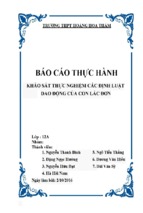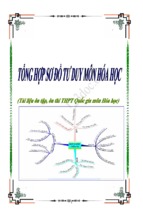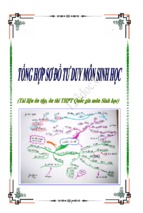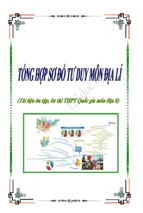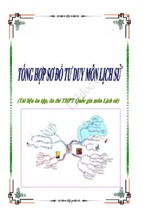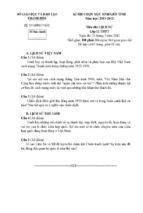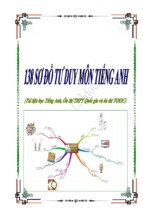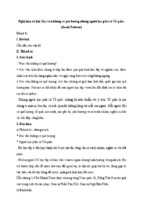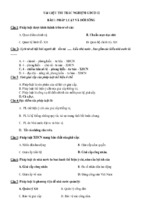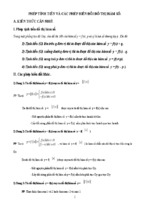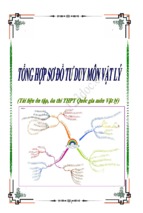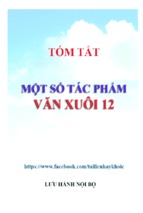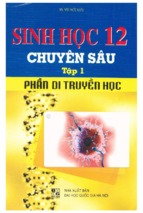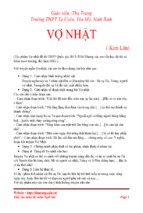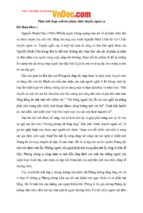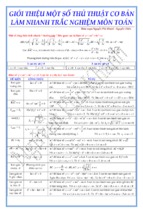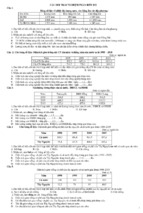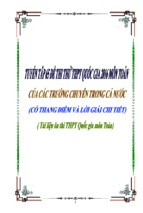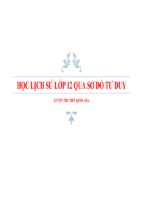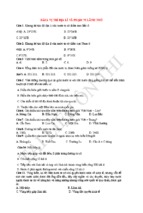BỘ ĐỀ THI THỬ
TỐT NGHIỆP THPT QUỐC GIA 2020
MÔN TIẾNG ANH (CÓ ĐÁP ÁN)
1. Đề minh họa thi THPT Quốc gia 2020 môn Tiếng Anh có đáp án - Trường THCS&THPT
Nguyễn Khuyến
2. Đề minh họa thi THPT Quốc gia 2020 môn Tiếng Anh có đáp án - Trường THPT
Phạm Văn Đồng
3. Đề minh họa thi THPT Quốc gia 2020 môn Tiếng Anh có đáp án - Trường THPT
Tôn Đức Thắng
4. Đề minh họa thi THPT Quốc gia 2020 môn Tiếng Anh có đáp án - Trường THCS&THPT
Võ Thị Sáu
5. Đề tham khảo thi THPT Quốc gia 2020 môn Tiếng Anh có đáp án - Trường THCS&THPT
Nguyễn Viết Xuân
6. Đề tham khảo thi THPT Quốc gia 2020 môn Tiếng Anh có đáp án - Trường THPT chuyên
Lương Văn Chánh
7. Đề tham khảo thi THPT Quốc gia 2020 môn Tiếng Anh có đáp án - Trường THPT
Nguyễn Thái Bình
8. Đề tham khảo thi THPT Quốc gia 2020 môn Tiếng Anh có đáp án - Trường THPT
Trần Bình Trọng
9. Đề tham khảo thi THPT Quốc gia 2020 môn Tiếng Anh có đáp án - Trường THPT
Trần Quốc Tuấn
10. Đề thi thử THPT Quốc gia 2020 môn Tiếng Anh có đáp án - Trường THPT
Phan Chu Trinh
11. Đề thi thử THPT Quốc gia 2020 môn Tiếng Anh có đáp án - Trường THCS&THPT
Nguyễn Bá Ngọc
12. Đề thi thử THPT Quốc gia 2020 môn Tiếng Anh có đáp án - Trường THCS&THPT
Võ Nguyên Giáp
13. Đề thi thử THPT Quốc gia 2020 môn Tiếng Anh có đáp án - Trường THPT
Nguyễn Trung Thiên
14. Đề thi thử THPT Quốc gia 2020 môn Tiếng Anh có đáp án - Trường THPT
Trần Suyền
15. Đề thi thử THPT Quốc gia 2020 môn Tiếng Anh có đáp án - Trường THPT
Nguyễn Thị Minh Khai
16. Đề thi thử THPT Quốc gia 2020 môn Tiếng Anh lần 1 có đáp án - Trường THPT
Bình Sơn
17. Đề thi thử THPT Quốc gia 2020 môn Tiếng Anh lần 1 có đáp án - Trường THPT chuyên
Bắc Ninh
18. Đề thi thử THPT Quốc gia 2020 môn Tiếng Anh lần 1 có đáp án - Trường THPT chuyên
Hà Giang
19. Đề thi thử THPT Quốc gia 2020 môn Tiếng Anh lần 1 có đáp án - Trường THPT chuyên
Hạ Long
20. Đề thi thử THPT Quốc gia 2020 môn Tiếng Anh lần 1 có đáp án - Trường THPT chuyên
KHTN
21. Đề thi thử THPT Quốc gia 2020 môn Tiếng Anh lần 1 có đáp án - Trường THPT chuyên
Long An
22. Đề thi thử THPT Quốc gia 2020 môn Tiếng Anh lần 1 có đáp án - Trường THPT chuyên
Trần Phú
23. Đề thi thử THPT Quốc gia 2020 môn Tiếng Anh lần 1 có đáp án - Trường THPT
Kim Liên
24. Đề thi thử THPT Quốc gia 2020 môn Tiếng Anh lần 1 có đáp án - Trường THPT
Lê Hữu Trác
25. Đề thi thử THPT Quốc gia 2020 môn Tiếng Anh lần 1 có đáp án - Trường THPT
Lý Thái Tổ
26. Đề thi thử THPT Quốc gia 2020 môn Tiếng Anh lần 1 có đáp án - Sở GD&ĐT
Hưng Yên
27. Đề thi thử THPT Quốc gia 2020 môn Tiếng Anh lần 1 có đáp án - Liên trường THPT
Nghệ An
28. Đề thi thử THPT Quốc gia 2020 môn Tiếng Anh lần 1 có đáp án - Sở GD&ĐT
Ninh Bình
29. Đề thi thử THPT Quốc gia 2020 môn Tiếng Anh lần 1 có đáp án - Trường THPT chuyên
Nguyễn Trãi
30. Đề thi thử THPT Quốc gia 2020 môn Tiếng Anh lần 1 có đáp án - Trường THPT chuyên
Thái Nguyên
31. Đề thi thử THPT Quốc gia 2020 môn Tiếng Anh lần 1 có đáp án - Trường THPT chuyên
Hoàng Văn Thụ
32. Đề thi thử THPT Quốc gia 2020 môn Tiếng Anh lần 2 có đáp án - Trường THPT chuyên
Thái Bình
SỞ GD-ĐT PHÚ YÊN
ĐỀ THI THPT NĂM 2020 (MINH HỌA)
TRƯỜNG THCS & THPT NGUYỄN KHUYẾN Bài thi: NGOẠI NGỮ; Môn thi: TIẾNG ANH
Thời gian làm bài: 60 phút, không kể thời gian phát đề
Mark the letter A, B, C, or D on your answer sheet to indicate the word whose underlined part
is pronounced differently from that of the rest in each of the following questions.
Question 1: A. wicked
B. watched C. stopped D. cooked
Question 2: A. head
B. bread
C. clean
D. spread
Mark the letter A, B, C or D on your answer sheet to indicate the word that differs from the
other three in the position of primary stress in each of the following questions.
Question 3: A. personality B. appropriate
C. information
D. entertainment
Question 4: A. remind
B. number
C. compaint
D. approach
Mark the letter A, B, C, or D on your answer sheet to indicate the correct answer to each of the
following questions.
Question 5: When he was a boy, one of his _____ was collecting stamp.
A. hobbies
B. cares
C. sports
D. profession
Question 6: I gave the waiter 50,000 VND and waited for my _____
A. supply
B. change
C. cash
D. cost
Question 7:That’s the first time _____an answer right today
A. I get
B. I’m getting
C. I have got D. cost
Question 8: When I last _________ Jane, she ________ to find a job
A. see/ was trying
B. saw/ was trying C. have seen/ tried
D. saw/tried
Question 9: Just let me ______ which day your parents will arrive and I’ll be glad _____ them
around Hanoi.
A. know/ to show
B. to know/ to show C. know/ showing
D. knowing/ to show
Question 10: The man asked the boys _________
A. why did they fight
B. why they were fighting
C. why the fight
D. why were they fighting
Question 11: - "That's a very nice skirt you're wearing."
-“
______”
A. How a compliment!
B. That's all right.
C. It's nice of you to say so. D. I like you said
so.
Question 15: You’ve just had breakfast , ?
A. do you
B. would you
C. don't you
D. haven't you
Question 13: UNICEF
supports and funds for the most disadvantaged children all over the
world.
A. presents
B. assists
C. provides
D. offers
Question 14: I am sending you my curriculum vitae _____ you will have a chance to study it
before our interview.
A. so that
B. because
C. for
D. since
Question 15: Jake, the boy who sat beside me in class, used to wear _ shirt to school.
A. an old cotton white
B. an old white cotton
C. a white cotton old
D. a cotton old white
Question 16: Without your help, I
the technical problem with my computer the other day.
A. can’t solve
B. couldn’t have solved
C. wouldn’t solve
D. could solve
Question 17:
broken several world records in swimming.
A. She is said to have
B. People say she had
C. It is said to have
D. She is said that she has
Question 18: -John: “ Would you like to join our volunteer group this summer?”- Mike: “
”.
A. I wouldn’t like. Thank you.
B. Do you think I would?
C. Yes, you’re a good friend.
D. Yes, I’d love to. Thanks.
Mark the letter A, B, C, or D on your answer sheet to indicate the word(s) CLOSEST in
meaning to the underlined word(s) in each of the following questions.
Question 19: She left school and immediately started to make her own way without help from her
family.
A. find her living B.try her living
C. hold her living
D.earn her living
Question 20: Yes, we went away on holiday last week, but it rained day in day out.
A. every single day B. every other day
C. every second day D.every two days
Mark the letter A, B C or D on your answer sheet to indicate the word(s) OPPOSITE in meaning
to the underlined word(s) in each of the following questions.
Question 21: He is a typical optimist, always looking on the bright side of everything.
A. pessimist
B. introvert
C. extrovert
D. activist
Question 22: When I was going shopping yesterday, I accidentally met one of my old friends in
high school.
A. by far
B. by heart
C. by chance
D. on purpose
Read the following passage and mark the letter A, B, C, or D on your answer sheet to indicate the
correct answer to each of the questions from 23 to 29.
A rather surprising geographical feature of Antarctica is that a huge freshwater lake, one of
the world's largest and deepest, lies hidden there under four kilometers of ice. Now known as Lake
Vostok, this huge body of water is located under the ice block that comprises Antarctica. The lake is
able to exist in its unfrozen state beneath this block of ice because its waters are warmed by
geothermal heat from the earth's core. The thick glacier above Lake Vostok actually insulates it from
the frigid temperatures on the surface.
The lake was first discovered in the 1970s while a research team was conducting an aerial survey of
the area. Radio waves from the survey equipment penetrated the ice and revealed a body of water of
indeterminate size. It was not until much more recently that data collected by satellite made
scientists aware of the tremendous size of the lake; the satellite-borne radar detected an extremely
flat region where the ice remains level because it is floating on the water of the lake.
The discovery of such a huge freshwater lake trapped under Antarctica is of interest to the
scientific community because of the potential that the lake contains ancient microbes that have
survived for thousands upon thousands of years, unaffected by factors such as nuclear fallout and
elevated ultraviolet light that have affected organisms in more exposed areas. The downside of the
discovery, however, lies in the difficulty of conducting research on the lake in such a harsh climate
and in the problems associated with obtaining uncontaminated samples from the lake without
actually exposing the lake to contamination. Scientists are looking for possible ways to accomplish
this.
Question 23: What is true of Lake Vostok?
A. It is completely frozen.
B. It is a saltwater lake.
C. It is beneath a thick slab of ice.
D. It is heated by the sun.
Question 24: All of the following are true about the 1970 survey of Antarctica EXCEPT that it
.
A. was conducted by air
B. made use of radio waves
C. could not determine the lake's exact size
D. was controlled by a satellite
Question 25: It can be inferred from the passage that the ice would not be flat if
.
A. there were no lake underneath
B. the lake were not so big
C. Antarctica were not so cold
D. radio waves were not used
Question 26: The word "microbes" in paragraph 3 could best be replaced by which of the
following?
A. Pieces of dust
B. Tiny bubbles
C. Tiny organisms
D. Rays of light
Question 27: Lake Vostok is potentially important to scientists because it
A. can be studied using radio waves
B. may contain uncontaminated microbes
C. may have elevated levels of ultraviolet light
D. has already been contaminated
Question 28: The last paragraph suggests that scientists should be aware of
A. further discoveries on the surface of Antarctica
B. problems with satellite-borne radar
equipment
C. ways to study Lake Vostok without contaminating itD. the harsh climate of Antarctica
Question 29: The purpose of the passage is to .
A. explain how Lake Vostok was discovered
B. provide satellite data concerning
Antarctica
C. discuss future plans for Lake Vostok D. present an unexpected aspect of Antarctica's geography
Read the following passage and mark the letter A, B, c, or D on your answer sheet to indicate the
correct answer to each of the questions from 30 to 37
Pollution emitted in industrial areas represents a threat to human health and the surrounding
natural resources. We have a tendency to believe that the production processes are the only source
of environmental damage, and often forget about the possible long-term effects of harmful
production practices. We may think that the closure of these huge industrial areas would improve
the quality of the environment. Unfortunately, this ignores the threat of the remaining waste, which
is abandoned and poorly stored. It represents an even bigger danger because it stands neglected as it
degrades and leaks into the earth without any control at all.
Changes in the water chemistry due to surface water contamination can affect all levels of an
ecosystem. It can affect the health of lower food chain organisms and, consequently, the availability
of food up through the food chain. It can damage the health of wetlands and damage their ability to
support healthy ecosystems, control flooding, and filter pollutants from storm water runoff. The
health of animals and humans are affected when they drink or bathe in contaminated water. In
addition water-based organisms, like fish and shellfish, can pile up and concentrate contaminants in
their bodies. When other animals or humans eat these organisms, they receive a much higher dose of
contaminant than they would have if they had been directly exposed to the original contamination.
Contaminated groundwater can badly affect animals, plants and humans if it is removed from
the ground by manmade or natural processes. Depending on the study of rocks of the area,
groundwater may rise to the surface through springs or seeps, flow sideways into nearby rivers,
streams, or ponds, or sink deeper into the earth. In many parts of fhe world, groundwater is pumped
out of the ground to be used for drinking, bathing, other household uses, agriculture, and industry.
Contaminants in the soil can harm plants when they take up the contamination through their
roots. Eating, breathing in, or touching contaminated soil, as well as eating plants or animals that
have piled up soil contaminants can badly affect the health of humans and animals.
Air pollution can cause breathing-related problems and other bad health effects as
contaminants are absorbed from the lungs into other parts of the body. Certain air contaminants can
also harm animals and humans when they contact the skin. Plants rely on breathing for their growth
and can also be affected by exposure to contaminants moved in the air.
(Source: Adapted from http://www.grid.unep.ch/waste/download/waste1213.pdf)
Question 30: What is the topic of the passage?
A. Sources of environmental damage
B. The pollution from the city
C. Bad effects of industrial waste
D. The quality of the environment
Question 31: According to the passage, the industry is likely to be thought as______.
A. a danger to the environment
B. the only source of pollution
C. the utmost harmful activity
D. a threat to human health
Question 32: The word “it” in the first paragraph refers to______.
A. the remaining waste
B. a danger
C. the environment
D. the threat of the remaining waste
Question 33: Which of the followings affect an ecosystem as the whole?
A. Surface water contamination
B. Soil contamination
C. Groundwater contamination
D. Air contamination
Question 34: According to the passage, which of the followings supports healthy ecosystems?
A. Lower food chain organisms B. Animals C. Water-based organisms D. Wetlands
Question 35: Which of the followings is NOT badly affected by contaminated groundwater?
A. Human
B. Plants
C. Rocks
D. Animals
Question 36: Which of the followings is the flow of water from the ground to the surface?
A. Streams
B. Ponds
C. Rivers
D. Springs
Question 37: Whichof the followings has the closest meaning to the word “absorbed” in the last
paragraph?
A. Consumed
B. Taken in
C. Swallowed
D. Piled up
Read the following passage and mark the letter A,B,C or D on your answer sheet to indicate
the
correct word or phrase that best fits each of the numbered blanks.
A trend that has emerged recently is the sharing of childcare (38) __________ between
husband and wife. Young couples will try to arrange their work schedules so that they work
opposite hours or shifts in order that one parent is always home with the children. Since childcare is
expensive, this saves money for the young couple trying to establish themselves and provide a
secure environment for the family. Husband and wife may also share household chores. Some
fathers are just as capable as mothers at cooking dinner, changing and bathing the baby, and doing
the laundry.
In some cases, the woman’s salary is for family (39) __________ and the father becomes the
“househusband." These cases are still fairly rare. One positive trend, however, is that fathers seem to
be spending more time with their children. In a recent survey, 41% of the children sampled said they
spend equal time with their mothers and fathers. “This is one of our most significant cultural
changes,” says Dr. Leon Hoffman, who co-directs the
Parent Child Center at the New York Psychoanalytic Society. In practice, for over 30 years,
Hoffman has found "a very dramatic difference in the involvement of the father in everything from
care-taking to general decision (40) __________ around kids' lives.”
Another factor has recently been added to the childcare formula. The number of people who work
from home nearly full-time rose 23% from the last decade. The (41) _________ of technology computers, faxes, teleconferencing - has made it easier for at-home workers to be constantly in
touch. Will this new flexibility in the workforce bring a positive change for the (42) __________ of
children? Only time will tell.
Question 38:A. abilities
B. possibilities
C. techniques D. responsibilities
Question 39: A. payment
B. expenses
C. fares
D. fees
Question 40: A. making
B. creating
C. holding
D. giving
Question 41: A. accessible
B. accessibly
C. access
D. accessibility
Question 42: A. well-being
B. security
C. comfort
D. interests
Mark the letter A, B, C, or D on your answer sheet to show the underlined, part that needs
correction.
Question 43: Digital clocks, however precise, they cannot be perfectly accurate because the
A
B
C
earth’s rotation changes slightly over years.
D
Question 44: On the floor of the Pacific Ocean is hundreds of flat-topped mountains morethan a
mile
A
B
C
D
beneath sea level.
Question 45: My sister told me that she had met my teacher at the supermarket yesterday.
A
B
C
D
Mark the letter A, B, C, or D on your answer sheet to indicate the sentence that best combines
each pair of sentences in the following questions.
Question 46: He did not work hard. He failed the exam.
A. Even though he failed the exam, he didn’t work hard.
B. Unless he had worked hard, he would have failed the exam.
C. If he had worked hard, he would have passed the exam.
D. However hard he worked, he failed the exam.
Question 47: Marry loved her stuffed animal when she was young. She couldn’t sleep without it.
A. When Marry was young, she loved her stuffed animal so as not to sleep with it.
B. As Marry couldn’t sleep without her stuffed animal when she was young, she loved it.
C. When Marry was young, she loved her stuffed animal so much that she couldn’t sleep without it.
D. When Marry was young, she loved her stuffed animal though she couldn’t sleep without it.
Mark the letter A, B, C, or D on your answer sheet to indicate the sentence that is closest in
meaning to each of the following questionsor indicate the correct answer to each of them.
Question 48: Although he was able to do the job, he wasn’t given the position.
A. The position wasn’t given to him in spite of his ability to do the job.
B. He was given neither the job nor the position.
C. Because he couldn’t do the job, he wasn’t given the position.
D. He got the position despite being unable to do the job.
Question 49: “You’re always making terrible mistakes”, said the teacher.
A. The teacher asked his students why they always made terrible mistakes.
B. The teacher realized that his students always made terrible mistakes,
C. The teacher complained about his students making terrible mistakes.
D. The teacher made his students not always make terrible mistakes.
Question 50: The criminal is believed to be living abroad
A. There’s a belief that that the criminal should be living abroad.
B. It is believed that the criminal is living abroad.
C. The belief is that the criminal should be living abroad.
D. It believes that the criminal is living abroad.
Đáp án
1-A
11-C
21-A
31-B
41-D
2-C
12-D
22-D
32-A
42-A
3-B
13-C
23-C
33-A
43-A
4-B
14-A
24-D
34-D
44-B
5-A
15-B
25-A
35-C
45-D
6-B
16-B
26-C
36-D
46-C
7-C
17-A
27-B
37-B
47-C
8-B
18-D
28-C
38-D
48-A
9-A
19-D
29-D
39-B
49-C
10-B
20-A
30-C
40-A
50-D
SỞ GIÁO DỤC VÀ ĐÀO TẠO PHÚ YÊN
TRƯỜNG THPT PHẠM VĂN ĐỒNG
ĐỀ MINH HỌA
Đề có 6 trang
KỲ THI TỐT NGHIỆP THPT QUỐC GIA
NĂM HỌC 2019-2020
Môn: TIẾNG ANH
Thời gian làm bài 60 phút, không kể thời gian phát đề
Mã 401
Mark the letter A, B, C or D on your answer sheet to indicate the word whose underlined part
differs from the other three in pronunciation in each of the following questions.
Question 1. A. watched
B. practiced
C. introduced
D. cleaned
Question 2. A. bamboo
B. good
C. foot
D. cook
Mark the letter A, B, C or D on your answer sheet to indicate the word that differs from the
other three in the position of primary stress in each of the following questions.
Question 3. A. effort
B. follow
C. target
D. reduce
Question 4. A. advantaged
B. minority
C. experience
D. education
Mark the letter A, B, C or D on your answer sheet to indicate the word whose underlined part
that needs correction in each of the following questions.
Question 5. It was in 1971 that transatlantic supersonic transportation became commercially
availability.
A
B
C
D
Question 6. Not only Laura's parents but also her husband think she should return to school
A
B
C
and finish her graduate degree.
D
Question 7. In an essay writing in 1779, Judith Sargeant Murray promoted the cause of
A
B
C
women's education.
D
Mark the letter A, B, C or D on your answer sheet to indicate the correct answer to each of the
following questions.
Question 8. You’ll look more _________ if you wear a nice suit and a tie.
A.respectable
B. respectful
C. respect
D. respectably
Question 9. You should look up the meaning of new words in the dictionary ___ misuse them.
A.so that not to
B. so not to
C. so as not to
D. so that not
Question 10. Ms Drake expects _____ about any revision in her manuscript before it is printed.
A.consulting
B. being consulted C. to consult
D. to be consulted
Question 11. James had, _____, saved the manuscript of his first novel from the burning house.
A.lastly
B. at last
C. lately
D. at least
Question 12. Don’t drive into that street. It is __________ one-way street.
A.a
B. an
C. the
D. X
Question 13. By the end of this month, I __________ for this company for two years.
A.have been working
B. will work
C. will be working
D. will have been working
Question 14. Betty is happy and ___________. She always looks on the bright side of life.
A.confident
B. honest
C. flexible
D. optimistic
Question 15. My mother had to work 12 hours a day in a factory just to ____________.
1
A.make ends meet B. call it a day
C. tighten the belt D. break the ice
Question 16. I’m having __________ difficulty understanding what she means.
A.great
B. broad
C. large
D. full
Question 17. After seeing the film “ Gone with the wind”, ________________.
A.the book was read by many people.
B. the book made many people want to read it.
C. many people wanted to read the book.
D. the reading of the book interested people.
Question 18. The bad weather caused serious damage to the crop. If only it _____ warmer.
A.has been
B. had been
C. was
D. were
Question 19. What my grandfather said ten years ago about my future career _____ to be true.
A.turned down
B. turned in
C. turned out
D. turned up
Question 20. We are doing so well that we’ll soon have to ________ on new staff to help us.
A.take
B. keep
C. pay
D. hire
Question 21. ___________ smoking is a causative factor of many diseases, there is not ban on
tobaco advertising.
A. However
B. Although
C. In spite of
D. Therefore
Mark the letter A, B, C or D on your answer sheet to indicate the most suitable response to
complete each of the following exchanges
Question 22. Ann: “ Let me wash the vegetables while you’re preparing the meat.”
Mai: “ ____________”
A. Good idea. I’ll do it for you
B. No problem.
C. Yes, please. But I can manage.
D. OK. Thank you very much.
Question 23. Alan: “ Would you mind posting this letter for me on the way to the shopping
mall?” Hoa: “________________”
A. No problem. Give it to me before I go.
B. Yes. I posted it for you.
C. Never mind. You don’t have to do it now. D. It is very kind of you to say so.
Mark the letter A, B, C, or D on your answer sheet to indicate the word(s) CLOSEST in
meaning to the underlined word(s) in each of the following questions.
Question 24. In the end her neighbour decided to speak his mind.
A.are given the right to
B. say exactly what he thought
C. say a few words
D. have a chat
Question 25. She is always diplomatic when she deals with angry students.
A.outspoken
B. tactful
C. strict
D. firm
Mark the letter A, B, C or D on your answer sheet to indicate the word(s) OPPOSITE in
meaning to the underlined word(s) in each of the following questions.
Question 26. However, how to make full use of these sources of energy is a question for
researchers all over the world.
A.complete
B. imperfect
C. partical
D. hungry
Question 27. Due to the efforts of conservationists and environmentalists, few people are
unaware of the problems of endangered species.
A.ignorant of
B.well-informed of C. indifferent to
D. adjustment to
Mark the letter A, B, C, or D on your answer sheet to indicate the sentence that is closest in
meaning to each of the following questions.
Question 28. It was wrong of you not to call the fire brigade at once.
2
A.Calling the fire brigade mus be done at once.
B. The fire brigade was called at the wrong time.
C. You should have called the fire brigade at once.
D. You didn’t call the fire brigade early and it was wrong.
Question 29. In the class of twenty, Jack is the third best student.
A.Two students in the class are smarter than Jack.
B.The class has only three smart students.
C. Jack is not as smart as most of the other students.
D.No other students in the class is as smart as Jack.
Question 30. “Are you sorry for what you did?”, the mother said to her son.
A. The mother told her son if you were sorry for what you had done.
B. The mother asked her son if he was sorry for what you had done.
C. The mother asked her son if he was sorry for what he had done.
D. The mother asked her son if he was sorry for what he did.
Mark the letter A, B, C, or D on your answer sheet to indicate the sentence that best combines
each pair of sentences in the following questions.
Question 31. He was very sorry that he didn’t see Audrey on her trip to London.
A.He greatly wished not seeing Audrey on her trip to London.
B. He greatly wished he had not seen Audrey on her trip to London.
C.He greatly regretted not to see Audrey on her trip to London.
D. He greatly regretted not having seen Audrey on her trip to London.
Question 32. Alice and Charles did not decide to move to a bigger house until after his birth of
their second child.
A.It was not until Alice and Charles had their second child did they decide to move to a bigger
house.
B. Not until Alice and Charles had their second child, they decided to move to a bigger house.
C. Only when Alice and Charles had their second child did they decide to move to a bigger
house.
D.Only when Alice and Charles had their second child, they decided to move to a bigger house.
Read the following passage and mark the letter A, B, C or D on your answer sheet to indicate
the correct word or phrase that best fits each of the numbered blanks from 33 to 37.
How to live independntly is, probably, one of the questions that are most frequently asked by
people, young and old. According to experts, there are a number of steps that people who want
to become (33) ___________ should follow. Below are some of them. First, you should believe
in yourself. That is the first and most important condition to make others believe in you. If you
don’t have (34) _________ in yourself, you will always turn to others for help every time you
have to make a decision. Believing in yourself will make you trust your own decisions, even if
they completely go against someone else’s. Second, get your own information. You should
watch and read the news from different sources. It’s important to read as much as possible, (35)
________ it is literature or daily newspapers. The information you get from reading will allow
you to get both sides of every story before you form an opinion. Being well-informed will keep
you from being a follower and will lead to more independent thought. (36)______, maintain
solid friendships. You don’t have to reject people as friends to be independent. In fact, your
independence is reinforced with good friends. When your friend needs someone to talk to, be
there for them, and listen to their problems with sympathetic and understanding attitude. This
way, you will not only help your friends, but their stories will help you to learn how to deal with
similar situations (37) ___________ my come up you later in your life.
3
Question 33. A. independent
Question 34. A. success
Question 35. A. either
Question 36. A. However
Question 37. A. that
B. independence
B. confident
B. whether
B. Although
B. which
C. independable
C. faith
C. if
C. Therefore
C. what
D.independently
D. confide
D. neither
D. Moreover
D. when
Read the following passage and mark the letter A, B, C or D on your answer sheet to indicate
the correct answer to each of the questions from 38 to 42.
IN ONE CUBIC FOOT
In any environment- forest, mountain, or water- you always see the big animals first:
birds, mammals, fish. But under your feet, on land or in the water, there are many smaller
organisms: insects, tiny plants, miniature sea creatures. They seem unimportant, but, in fact,
these sea creatures and ground dwellers are “ the heart of life on the Earth”, says naturalist E.O.
Wilson. Without them, our world would change dramatically.
Most organisms on the Earth live on the ground or just below it. Here, they are not part of
an important cycle. Plants and animals fall to the ground when they die. Later, tiny insects and
other organisms break down the dead plant and animal material. This process eventually returns
nutrients to the soil and gives plants energy. Plants can then help to maintain a healthy
environment for humans and other animals.
Despite their importance, scientists know very little about most ground organisms. To
learn more, photographer David Liittschwager went to different place around the world,
including a forest, a river, a mountain, and a coral reef. In each place, he put a green 12-inch
cube on the ground or in the water. Then he and his team counted and photographed the
organisms that lived in or moved through the cube. Often they discovered hundreds, some only a
millimeter in size. “It was like finding little gems.” he says. In the coral reef in French
Polynesia, he saw thousands of creatures in the cube and photographed 600. The team identified
as many as possible, but it was difficult. Many of the animals they found were new species.
Question 38. Another title of the passge could be _____________.
A. Dangers to Ground Creatures
B. The Importance of Tiny Organisms
C. Saving Small Animals in Cubes
D. The Life of Nutrients
Question 39. The word “miniature” in paragraph 1 means _________________.
A.very small
B. very large
C. very beautiful
D. very important
Question 40. The word “their” in paragraph 3 refers to _______________.
A.scientists
B. ground organisms
C. cubes
D. nutrients
Question 41. All of the followings are true about Liittschwager and his team EXCEPT that
________.
A. they went to various places in the world.
B. they discovered numberous organisms in small sizes
C. the examined cubes by putting them on the ground or in the water
D. they did some experiments with the organisms
Question 42. Why was it difficult to identify the creatures at the coral reef?
A. Many were new to science.
B.The water was cloudy.
C. They were too small.
D. Many of them looked the same.
Read the following passage and mark the letter A, B, C or D on your answer sheet to indicate
the correct answer to each of the questions from 43 to 50.
Learning means acquiring knowledge or developing the ability to perform new
behaviours. It is common to think of learning as something that takes place in school, but much
4
of human learning occurs outside the classroom, and people continue to learn throughout their
lives.
Even before they enter school, young children learn to walk, to talk, and to use their
hands to manipulate toys, food, and other objects. They use all of their senses to learn about the
sights, sounds, tastes, and smells in their environments. They learn how to interact with their
parents, siblings, friends, and other people important to their world. When they enter school,
children learn basic academic subjects such as reading, writing, and mathematics. They also
continue to learn a great deal outside the classroom. They learn which behaviors are likely to be
rewarded and which are likely to be punished. They learn social skills for interacting with other
children. After they finish school, people must learn to adapt to the many major changes that
affect their lives, such as getting married, raising children, and finding and keeping a job.
Because learning continues throughout our lives and affects almost everything we do, the
study of learning is important in many different fields. Teachers need to understand the best
ways to educate children. Psychologists, social workers, criminologists, and other humanservice workers need to understand how certain experiences change people’s behaviours.
Employers, politicians, and advertisers make use of the principles of learning to influence the
behavior of workers, voters and consumers.
Learning is closely related to memory, which is the storage of information in the brain.
Psychologists who study memory are interested in how the brain stores knowledge, where this
storage takes place, and how the brain later retrieves knowledge when we need it. In contrast,
psychologists who study learning are more interested in behavior and how behavior changes as a
result of a person’s experiences.
There are many forms of learning, ranging from simple to complex. Simple forms of
learning involve a single stimulus. A stimulus is anything perceptible to the senses, such as a
sight, sound, smell, tough, or taste. In a form of learning known as classical conditioning, people
learn to associate two stimuli that occur in sequence, such as lightning followed by thumder. In
operant conditioning, people learn by forming an association between a behavior and its
consequences (reward or punishment). People and animals can also learn by observation-that is,
by watching others perform behaviors. More complex forms of learning include learning
languages, concepts, and motor skills.
Question 43. According to the passage, which of the following is learning in broad view
comprised of?
A. Acquisition of social and behavioural skills.
B. Knowledge acquisition and ability development.
C. Acquisition of academic knowledge.
D. Knowledge acquisition outside the classroom.
Question 44. The word “retrieves” in paragraph 4 is closest in meaning to ____________.
A.generates
B. recovers
C. creates
D. gains
Question 45. Which of the following statements is NOT true according to the passage?
A. Psychologists studying memory are concerned with how the stored knowledge is used.
B. Psychologists studying memory are concerned with the brain’s storage of knowledge.
C. Psychologists are all interested in memory as much as behaviours.
D. Psychologists studying are interested in human behaviours.
Question 46. According to the passage, what are children NOT usually taught outside the
classroom?
A. Literacy and calculation
B. Life skills
C. Interpersonal communication
D. Right from wrong
5
Question 47. According to the passage, the study of learning is important in many fields due to
_____________.
A.the great influence of the on-going learning process
B.the influence of various behaviours in the learning process
C. the exploration of the best teaching methods
D. the need for certain experiences in various areas
Question 48. It can be inferred from the passage that social workers, employers, and politicians
concern themselves with the study of learning because they need to __________.
A.change the behaviours of the objects of their interest towards learning
B.make the objects of their interest more aware of the importance of learning
C. understand how a stimulus relates to the senses of the objects of their interest
D. thoroughly understand the behaviours of the objects of their interest
Question 49. Which of the following can be inferred about the learning process from the
passage?
A.It is more interesting and effective in school than that in life.
B. It becomes less challenging and complicated when people grow older.
C. It plays a crucial part in improving the learner’s motivation in school.
D. It takes place more frequently in real life than in academic institutions.
Question 50. The passage mainly discuss ___________.
A.simple forms of learning
B. practical examples of learning inside the classroom
C. application of learning principles to formal education
D. general principles of learning
*** THE END***
6
SỞ GIÁO DỤC VÀ ĐÀO TẠO PHÚ YÊN
TRƯỜNG THPT PHẠM VĂN ĐỒNG
ĐỀ MINH HỌA
Đề có 6 trang
KỲ THI TỐT NGHIỆP THPT QUỐC GIA
NĂM HỌC 2019-2020
Môn: TIẾNG ANH
Thời gian làm bài 60 phút, không kể thời gian phát đề
Mã 401
Mark the letter A, B, C or D on your answer sheet to indicate the word whose underlined part
differs from the other three in pronunciation in each of the following questions.
Question 1. A. watched
B. practiced
C. introduced
D. cleaned
Question 2. A. bamboo
B. good
C. foot
D. cook
Mark the letter A, B, C or D on your answer sheet to indicate the word that differs from the
other three in the position of primary stress in each of the following questions.
Question 3. A. effort
B. follow
C. target
D. reduce
Question 4. A. advantaged
B. minority
C. experience
D. education
Mark the letter A, B, C or D on your answer sheet to indicate the word whose underlined part
that needs correction in each of the following questions.
Question 5. It was in 1971 that transatlantic supersonic transportation became commercially
availability.
A
B
C
D (available)
Question 6. Not only Laura's parents but also her husband think she should return to school
A
B (thinks)
C
and finish her graduate degree.
D
Question 7. In an essay writing in 1779, Judith Sargeant Murray promoted the cause of
A
B (written)
C
women's education.
D
Mark the letter A, B, C or D on your answer sheet to indicate the correct answer to each of the
following questions.
Question 8. You’ll look more _________ if you wear a nice suit and a tie.
A.respectable
B. respectful
C. respect
D. respectably
Question 9. You should look up the meaning of new words in the dictionary ___ misuse them.
A.so that not to
B. so not to
C. so as not to
D. so that not
Question 10. Ms Drake expects _____ about any revision in her manuscript before it is printed.
A.consulting
B. being consulted C. to consult
D. to be consulted
Question 11. James had, _____, saved the manuscript of his first novel from the burning house.
A.lastly
B. at last
C. lately
D. at least
Question 12. Don’t drive into that street. It is __________ one-way street.
A.a
B. an
C. the
D. X
Question 13. By the end of this month, I __________ for this company for two years.
A.have been working
B. will work
C. will be working
D. will have been working
Question 14. Betty is happy and ___________. She always looks on the bright side of life.
A.confident
B. honest
C. flexible
D. optimistic
Question 15. My mother had to work 12 hours a day in a factory just to ____________.
1
A.make ends meet B. call it a day
C. tighten the belt D. break the ice
Question 16. I’m having __________ difficulty understanding what she means.
A.great
B. broad
C. large
D. full
Question 17. After seeing the film “ Gone with the wind”, ________________.
A.the book was read by many people.
B. the book made many people want to read it.
C. many people wanted to read the book.
D. the reading of the book interested people.
Question 18. The bad weather caused serious damage to the crop. If only it _____ warmer.
A.has been
B. had been
C. was
D. were
Question 19. What my grandfather said ten years ago about my future career _____ to be true.
A.turned down
B. turned in
C. turned out
D. turned up
Question 20. We are doing so well that we’ll soon have to ________ on new staff to help us.
A.take
B. keep
C. pay
D. hire
Question 21. ___________ smoking is a causative factor of many diseases, there is not ban on
tobaco advertising.
A. However
B. Although
C. In spite of
D. Therefore
Mark the letter A, B, C or D on your answer sheet to indicate the most suitable response to
complete each of the following exchanges
Question 22. Ann: “ Let me wash the vegetables while you’re preparing the meat.”
Mai: “ ____________”
A. Good idea. I’ll do it for you
B. No problem.
C. Yes, please. But I can manage.
D. OK. Thank you very much.
Question 23. Alan: “ Would you mind posting this letter for me on the way to the shopping
mall?” Hoa: “________________”
A. No problem. Give it to me before I go.
B. Yes. I posted it for you.
C. Never mind. You don’t have to do it now. D. It is very kind of you to say so.
Mark the letter A, B, C, or D on your answer sheet to indicate the word(s) CLOSEST in
meaning to the underlined word(s) in each of the following questions.
Question 24. In the end her neighbour decided to speak his mind.
A.are given the right to
B. say exactly what he thought
C. say a few words
D. have a chat
Question 25. She is always diplomatic when she deals with angry students.
A.outspoken
B. tactful
C. strict
D. firm
Mark the letter A, B, C or D on your answer sheet to indicate the word(s) OPPOSITE in
meaning to the underlined word(s) in each of the following questions.
Question 26. However, how to make full use of these sources of energy is a question for
researchers all over the world.
A.complete
B. imperfect
C. partical
D. hungry
Question 27. Due to the efforts of conservationists and environmentalists, few people are
unaware of the problems of endangered species.
A.ignorant of
B.well-informed of C. indifferent to
D. adjustment to
Mark the letter A, B, C, or D on your answer sheet to indicate the sentence that is closest in
meaning to each of the following questions.
Question 28. It was wrong of you not to call the fire brigade at once.
2
A.Calling the fire brigade mus be done at once.
B. The fire brigade was called at the wrong time.
C. You should have called the fire brigade at once.
D. You didn’t call the fire brigade early and it was wrong.
Question 29. In the class of twenty, Jack is the third best student.
A.Two students in the class are smarter than Jack.
B.The class has only three smart students.
C. Jack is not as smart as most of the other students.
D.No other students in the class is as smart as Jack.
Question 30. “Are you sorry for what you did?”, the mother said to her son.
A. The mother told her son if you were sorry for what you had done.
B. The mother asked her son if he was sorry for what you had done.
C. The mother asked her son if he was sorry for what he had done.
D. The mother asked her son if he was sorry for what he did.
Mark the letter A, B, C, or D on your answer sheet to indicate the sentence that best combines
each pair of sentences in the following questions.
Question 31. He was very sorry that he didn’t see Audrey on her trip to London.
A.He greatly wished not seeing Audrey on her trip to London.
B. He greatly wished he had not seen Audrey on her trip to London.
C.He greatly regretted not to see Audrey on her trip to London.
D. He greatly regretted not having seen Audrey on her trip to London.
Question 32. Alice and Charles did not decide to move to a bigger house until after his birth of
their second child.
A.It was not until Alice and Charles had their second child did they decide to move to a bigger
house.
B. Not until Alice and Charles had their second child, they decided to move to a bigger house.
C. Only when Alice and Charles had their second child did they decide to move to a bigger
house.
D.Only when Alice and Charles had their second child, they decided to move to a bigger house.
Read the following passage and mark the letter A, B, C or D on your answer sheet to indicate
the correct word or phrase that best fits each of the numbered blanks from 33 to 37.
How to live independntly is, probably, one of the questions that are most frequently asked by
people, young and old. According to experts, there are a number of steps that people who want
to become (33) ___________ should follow. Below are some of them. First, you should believe
in yourself. That is the first and most important condition to make others believe in you. If you
don’t have (34) _________ in yourself, you will always turn to others for help every time you
have to make a decision. Believing in yourself will make you trust your own decisions, even if
they completely go against someone else’s. Second, get your own information. You should
watch and read the news from different sources. It’s important to read as much as possible, (35)
________ it is literature or daily newspapers. The information you get from reading will allow
you to get both sides of every story before you form an opinion. Being well-informed will keep
you from being a follower and will lead to more independent thought. (36)______, maintain
solid friendships. You don’t have to reject people as friends to be independent. In fact, your
independence is reinforced with good friends. When your friend needs someone to talk to, be
there for them, and listen to their problems with sympathetic and understanding attitude. This
way, you will not only help your friends, but their stories will help you to learn how to deal with
similar situations (37) ___________ my come up you later in your life.
3
Question 33. A. independent
Question 34. A. success
Question 35. A. either
Question 36. A. However
Question 37. A. that
B. independence
B. confident
B. whether
B. Although
B. which
C. independable
C. faith
C. if
C. Therefore
C. what
D.independently
D. confide
D. neither
D. Moreover
D. when
Read the following passage and mark the letter A, B, C or D on your answer sheet to indicate
the correct answer to each of the questions from 38 to 42.
IN ONE CUBIC FOOT
In any environment- forest, mountain, or water- you always see the big animals first:
birds, mammals, fish. But under your feet, on land or in the water, there are many smaller
organisms: insects, tiny plants, miniature sea creatures. They seem unimportant, but, in fact,
these sea creatures and ground dwellers are “ the heart of life on the Earth”, says naturalist E.O.
Wilson. Without them, our world would change dramatically.
Most organisms on the Earth live on the ground or just below it. Here, they are not part of
an important cycle. Plants and animals fall to the ground when they die. Later, tiny insects and
other organisms break down the dead plant and animal material. This process eventually returns
nutrients to the soil and gives plants energy. Plants can then help to maintain a healthy
environment for humans and other animals.
Despite their importance, scientists know very little about most ground organisms. To
learn more, photographer David Liittschwager went to different place around the world,
including a forest, a river, a mountain, and a coral reef. In each place, he put a green 12-inch
cube on the ground or in the water. Then he and his team counted and photographed the
organisms that lived in or moved through the cube. Often they discovered hundreds, some only a
millimeter in size. “It was like finding little gems.” he says. In the coral reef in French
Polynesia, he saw thousands of creatures in the cube and photographed 600. The team identified
as many as possible, but it was difficult. Many of the animals they found were new species.
Question 38. Another title of the passge could be _____________.
A. Dangers to Ground Creatures
B. The Importance of Tiny Organisms
C. Saving Small Animals in Cubes
D. The Life of Nutrients
Question 39. The word “miniature” in paragraph 1 means _________________.
A.very small
B. very large
C. very beautiful
D. very important
Question 40. The word “their” in paragraph 3 refers to _______________.
A.scientists
B. ground organisms
C. cubes
D. nutrients
Question 41. All of the followings are true about Liittschwager and his team EXCEPT that
________.
A. they went to various places in the world.
B. they discovered numberous organisms in small sizes
C. the examined cubes by putting them on the ground or in the water
D. they did some experiments with the organisms
Question 42. Why was it difficult to identify the creatures at the coral reef?
A. Many were new to science.
B.The water was cloudy.
C. They were too small.
D. Many of them looked the same.
Read the following passage and mark the letter A, B, C or D on your answer sheet to indicate
the correct answer to each of the questions from 43 to 50.
Learning means acquiring knowledge or developing the ability to perform new
behaviours. It is common to think of learning as something that takes place in school, but much
4
- Xem thêm -

